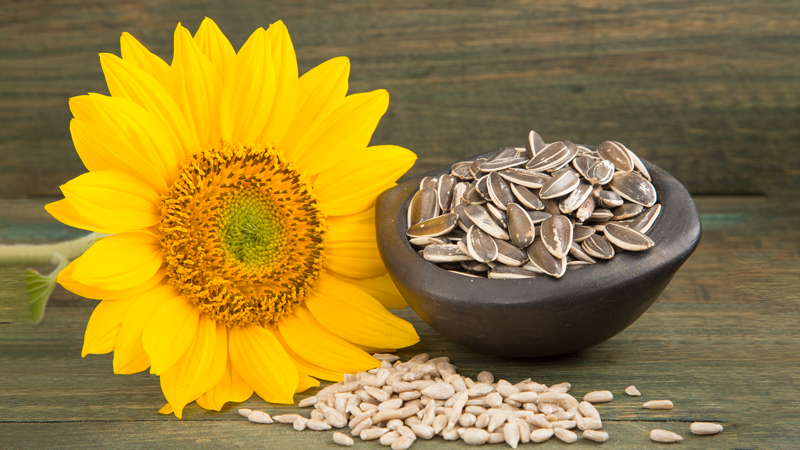
Sunflower seeds make a delicious add-on to salads or soups, fantastic snacks, and a great nut butter substitute for those with allergies to peanuts or other nuts. They are rich in many tops nutrients, like copper, vitamin b1, magnesium, manganese, and phosphorus; but their top essential nutrient is vitamin E. Just one portion can give us 82% of what we need in one day.
Vitamin E is a strong antioxidant that helps protect our cells from free radicals, boosts our immune system, helps our heart health by keeping our LDL cholesterol fat cells from oxidizing, and protects our brain from oxidative stress that can lead to degenerative diseases, including Alzheimer’s disease. One great advantage of getting it from sunflower seeds is that vitamin E needs fat for absorption, and sunflower seeds are, of course, fatty.
Sunflower seeds can reduce cholesterol levels due to their high amount of phytosterols, together with other phytonutrients and fiber. Plus, sunflower seeds can also help us feel happy! This is because they are rich in tryptophan, the building block of serotonin.
Should we worry about their high omega-6 content?
You will notice that these seeds are very high in omega-6 fatty acids, but eating the seeds whole and in moderation, maintaining a 1:3 ratio of omega-3 vs. omega-6, will give us the right amount of omega-6 fatty acids that our body needs for our brain, our bones, our hormones, our skin, and our cells. On the other hand, if we ingest too much omega-6 through sunflower oil or other seed oils, we could end up producing too much arachidonic acid (AA) in our body, the inflammatory omega-6. So, avoid or limit your seed-oil intake and nurture your body with whole seeds instead. Visit our omega-6 page to learn more.
On his Daily Dozen, Dr. Greger recommends eating 1/4 cup of seeds or nuts per day, or 2 tablespoons of nut or seed butter. So, go ahead and add these powerful seeds to your rotation, but make sure you’re also eating other nuts (if you’re not allergic) and/or seeds on different days to get a diversity of nutritional benefits.
Sunflower Seed Nutrition Calculator
Use our personalized nutrition calculator to discover the percentage of daily nutrition needs you and your family can get from eating sunflower seeds.
Nutrition needs vary according to age, sex, and whether women of reproductive age are pregnant or breastfeeding. Fill out the form below for yourself and for your family members to get personalized results.*
* Calculated as a percentage of the Recommended Daily Allowances (RDAs) as established by the U.S. Department of Agriculture and the U.S. Department of Health and Human Services. Based on sunflower seeds nutritional information provided by the U.S. Department of Agriculture.
References
Related Instagram Content
